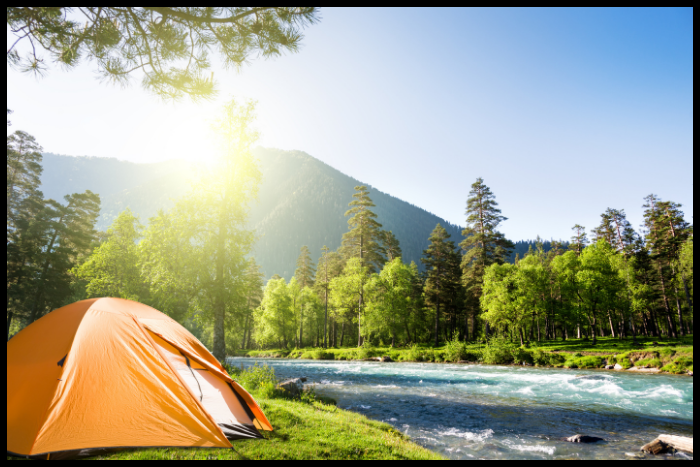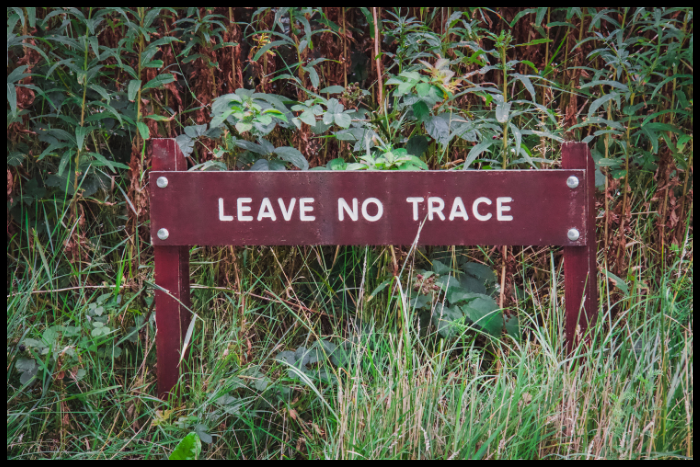There’s nothing quite picture-perfect as a site by a beautiful lake or river when looking for a spot to set up camp. However, the general advice within the camping community is to not set up camp near water. Perhaps you’ve thought about planning a trip to a lakeside area but are worried about the potential impact on your camp and the environment.
Camping near water is discouraged as it may harm the fragile waterside ecosystem, increase exposure to flooding, and attract mosquitoes. By maintaining a 200-foot distance, you protect both the environment and your camp from potential hazards while ensuring a safer, more enjoyable experience.
So why precisely should you forgo that perfect riverside spot? What are the important reasons that you shouldn’t camp near water?
Why is Camping Near Water a Bad Idea
The rationale for not camping near water can be split into two main categories: firstly, risks to the surrounding environment or wildlife and, secondly, risks to your camp.
First, we’ll look at the potential harm you could do to the area.
1. Risks to the Environment
a. Damage to the ecosystem
The ecosystem around water sources is extremely sensitive, and any human activity in the vicinity tends to disrupt the fragile balance of the area.
Camping activities, such as washing up, campfires, and toilet activities, can wreak havoc on this delicate set-up.
Although many campers practice a ‘leave no trace’ policy in the backcountry, significant damage to the natural surroundings can still occur.
For example, even biodegradable soap is not appropriate for use directly in natural water sources, and human waste, even if buried, can cause significant pollution.
Practically speaking, trekking up and down to your waterside camp can erode the area’s soil, which acts as a buffer between the water and the land (known as a ‘riparian zone’).
While it may be wonderful to mess about on the banks of the river, lake, or another water source, the soil breakdown and vegetation damage can negatively impact the water body as its important protective buffer zone is worn away and no longer functions as it should.

b. Wildlife crossing
Just as campers and nature lovers are drawn to the beauty of lakes, rivers, or creeks, animals and wildlife also gravitate to these areas, although for more practical reasons.
The picturesque creek you’ve just pitched your tent beside may well be a favorite watering hole of the local wildlife.
The impact of your campsite choice can have a two-fold impact. You may upset the rhythms of the wildlife, which may be scared off by your presence, and you must find an alternative water source.
Or, you may put yourself at risk of encountering some bigger predators during your time at camp.
Depending on where you are camping, there’s a chance you are more likely to experience a visit from a larger predator if you set up by water, particularly if it looks like a well-worn site since they may take a visit to quench their thirst.
Since avoiding bears and more dangerous animals is generally sensible advice, avoiding locations where your chance of an encounter is higher makes sense.
2. Inconveniences at camp
a. Flooding
Whether by a river, creek, lake, or beach, camping too close to water might put your camp at risk.
While the area may look pristine and beautiful, it’s a sensible idea to check for how wet the ground is in these areas.
Anywhere that seems slightly marshy or boggy (or has marsh grass growing in the area) should be avoided since it indicates that the area may sometimes be underwater.
You may have taken some beautiful photos of your camp by the lakeshore, but these may be the only happy memories you return home with.
All waterside campsites may be prone to flooding, particularly if the water level rises at night or the tide comes in when you are tucked up blissfully unaware in your sleeping bag.
You may wake up to a very soggy situation that even the most waterproof tent won’t protect you from.
b. Mosquitos
Another deterrent for camping at waterside locations is that these are very likely home to mosquitos or other biting insects, which can negatively impact your camping experience.
Although it may sound trivial, enduring a swarm of whining and biting bugs may mean that you can’t enjoy an evening around the campfire on the lakeshore but will need to retreat to your tent for cover.
Many campers reflect on how irritating and inescapable mosquitoes spoiled their blissful sunset on the lakeshore.
Of course, using any kind of mosquito repellent spray or substance can be extremely damaging to the surrounding ecosystem. It should not be used in an attempt to mitigate this problem.
3. Respecting others
As a final point, it’s worth considering your site’s impact on other hikers or campers who are also seeking an escape into nature.
Having the lake, river, or creek on your doorstep may seem perfect as soon as you unzip your tent door, but just one tent can spoil the experience for any others visiting.
By pitching your tent away from the shore, even hidden within the treeline, if possible, you can preserve the pristine environment for all visiting.
You can still stroll down to the lake, river, or creek whenever suits you. Every other hiker in the vicinity can experience a sense of solitude from seeing a natural landscape unblemished by human activity.
The Ethical Way to Camp Near Water (If You Absolutely Have To)
Now we’ve explained the why, let’s turn to the how. How can you set up camp near a river, lake, or by the sea in a way that respects both the environment and other visitors to the area?
Pick a location 200 feet or more away from the body of water you are camping near and 200 feet away from any trail.
This ensures that you don’t disrupt the water source or disturb or experience disturbance from any hikers or animals using the trail.
Try to choose a secluded site hidden from view to enhance the enjoyment of both your and others’ camping experience and make sure you check for wet or boggy ground, even if you’ve measured that you’re 200 feet away from water.
To minimize the likelihood of being ravaged by mosquitoes, try to pitch up in an area with a breeze since these pesky creatures are more likely to gather in places where the air is still and stagnant.
As always, aim to practice the leave no trace principles when camping, and be especially aware of your washing-up practices and how you’re disposing of any human waste.

Always Remember the 200-feet Rule
Keeping a good distance from water when camping is vital for protecting the environment and wildlife that we all enjoy, as well as for maintaining a pleasant camp for ourselves.
Follow the 200 feet rule to help ensure everyone can enjoy these delicate ecosystems’ beauty.
